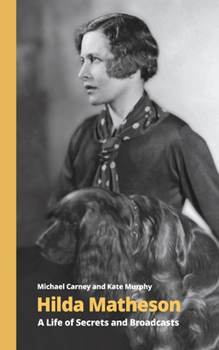Hilda Matheson: A Life of Secrets and Broadcasts
Vita Sackville-West was infatuated with her. Virginia Woolf hated her. Sir John Reith resented her but couldn't do without her skills: she transformed the BBC into a broadcaster for the people. Lady Astor was her close friend, making a way for her into the heart of Britain's political, cultural and intellectual aristocracy. Hilda Matheson was one of the most important women behind the scenes in Britain's public life between the wars and an influential networker between feminist, media and political powers. She packed more into her short life than most people would even think possible. Every challenge was accepted, and she lived her life to the full.
Hilda worked for MI6 in the First World War, then became Lady Astor's political secretary, the first woman MP to take her seat in the House of Commons. Poached by Sir John Reith, Hilda moved to the BBC to become the first Talks Director for the fledgling BBC, but Reith turned against her liberalising energies, and Hilda resigned rather than compromise her principles. Selected to lead a monumental survey of African economics and natural resources Hilda laid the groundwork for the move away from British colonialism. At the beginning of the Second World War she was put in charge of a new propaganda unit to tell Britain's story to its allies and enemies alike through recordings, images and books. Having suffered all her life from Graves' disease, which afflicted her with the phenomenal energy levels she needed to tackle the huge tasks in her career, Hilda died during a routine operation in 1940, aged 52.
The life of Hilda Matheson is told by her first biographer Michael Carney and by BBC producer Kate Murphy. This passionate, loving woman has finally been the given the memorial her energies and achievements deserve. Her letters to Vita Sackville-West and the Astor papers form the heart of her story, revealing her candid and devoted nature.





